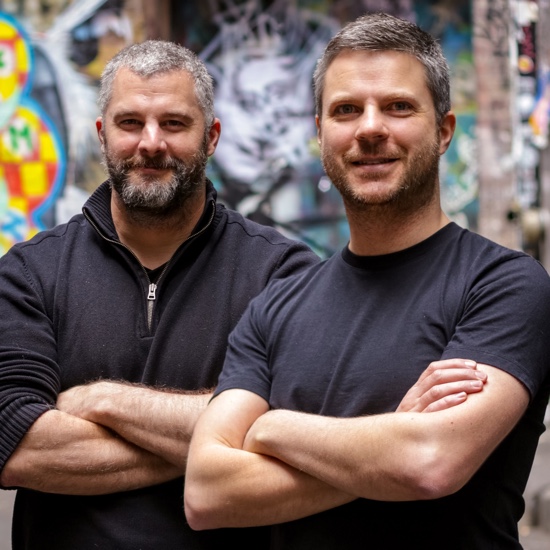Day 1
- Sydney: November 9th

Lessons from the Death of the PC
Chris Messina, Inventor Hashtag
If 2016 was the year that apps became conversational, it’s been a long time coming. As messaging apps eclipse conventional social networks and our environment is increasingly hooked up with the internet, new opportunities arise to create increasingly personalised experiences for individuals, groups, and teams, as well as lessons to take from the slow demise of the PC.
Additionally, several new messaging and voice platforms have emerged, putting us on the precipice overlooking a broad shift in how technology is designed and serves people. We're seeing new hardware and embedded technologies emerge that spell new paradigms for user experience, voice experience, and conversation experience.
With all of these changes seemingly happening at once, there are considerable questions confronting businesses about how, when, why, and even if they should get involved. Join Chris Messina as he guides you through why this is happening now and how to participate and evaluate whether joining the conversational product revolution makes sense for your business.

From Web & Mobile to Messaging - To Bot or Not to Bot
Amir Shevat, Head of Developer Relations Slack
We are seeing a big move from web and mobile applications to conversational interfaces. The future of work is coming, and it does not include endless email chains, 30 open browser tabs, or siloed tools. Amir Shevat, Slack’s head of developer relations, will show you how outmoded ways of working can be made delightful through conversational UI.
You’ll learn how bot builders can enable teams across every function to complete high-frequency, low-effort tasks, and you’ll come away learning how to leverage platforms such as Slack’s to build powerful apps for your team. We will discuss what type of bot solutions we see in the market, which work and which do not, and when to bot or not to bot.

13 Golden Rules of Typography on the Web
Richard Rutter, Production Director Clearleft
Typography is what comes between the author and the reader. This is as true on the web as it is in any other medium. If a text has anything at all significant to say, it needs a typographer’s care, which will in turn be repaid by the reader’s attention. If you design websites or use CSS then you are a typographer whether you know it or not.
This talk will give you will give a set of guidelines that deftly combine implementation details with typographic theory and set you on the road to designing beautiful and effective responsive typography.

Workers of the Web Unite
Jessica Edwards, Front End Developer Holler
Historically, we have developed web applications with the assumption that the end user is connected to the internet. With the ever increasing browser support of Service Workers, however, this assumption is quickly becoming outdated: developers now have the opportunity to create websites that can work offline, independent of network status, with great flexibility.
But let’s take a step back: what is the Service Worker API? How does it enable developers to develop web applications with offline capabilities? To help answer these questions, one should look to its predecessor: the Web Worker API. By understanding what the Web Worker API provides us (and what it doesn’t), we can better understand Service Workers and how to use them.

Designing Conversations
Lauren Lucchese, Head of AI Content CapitalOne
As designers, we all know that creating a product or experience that people know how (and actually want!) to engage with is everything. With GUIs, we can design visual cues that assist with usability and solve for understandability. But, how do we design for conversational UIs, when the content is the experience, and words are the interface?
In this session, Lauren will talk about how to design contextually relevant conversations for bots that evoke emotion and lead to relationships rooted in trust, empathy, and understanding.

Keep Betting on JavaScript
Kyle Simpson, Author You Don't Know JavaScript" series
Brendan Eich's famous quip, "Always bet on JavaScript", revels in JS's history of naysayers predicting that we'd eventually reach a point where JS couldn't grow to meet the demands of modern development; it turns out those have always been bad bets.
It's safe to say JS is no longer trying to prove itself. It has arrived. Even if it was once a "dumb kid brother" to something like Java, it's now fully a first class citizen in the programming language ecosystem. JS is certainly not the only dominant language or the "best tool" for every situation. But increasingly, most tech stacks have it as a central part of their strategy.
In this talk, we're going to look forward at what's over the horizon for JavaScript, the world's most ubiquitous and popular (by usage if not emotion!) language. We'll look at Web Assembly, upcoming proposals that will be game changers for the web platform, and more. A bet is always a guess, but let's explore why bets on JS will only get sweeter.

DesignOps: The Future of Design, as a Service
Mark Dalgleish, DesignOps Lead SEEK
Design systems are playing an ever-increasing role in allowing us to produce world-class design at scale. However, for these systems to truly deliver on their potential, they need to be properly integrated into the rest of the organisation, speaking the same language as those building and delivering products to our end users.
As a result, we're beginning to see the rise of Design Operations ("DesignOps" for short) within companies like Salesforce, Airbnb and Australia's own SEEK, with dedicated engineering resources being embedded within teams that historically would have only contained designers. By focusing developers entirely on translating a company's design language into production-ready code and monitoring its real-world effectiveness, we can empower our design teams to deliver high quality design across large organisations at a pace that simply wasn't previously possible.
But what does DesignOps look like in practice? How do we ensure developers and designers are speaking the same language? What should your organisation expect from such a fundamental shift in perspective, and how do we measure success? Together, we'll examine the benefits, challenges and future potential of this approach through the real-life experiences of an engineer who's been living in a design team for the past year.

Meta Programming in JavaScript
Mehdi Valikhani, Senior Software Engineer AutoPilot HQ
Meta whaaat?! Wikipedia defines it as "a programming technique in which computer programs have the ability to treat programs as their data", but I define meta programming as a way to highly customise built-in features of a programming language.
Long a staple of porgramming languages like Lisp, in this session, Mehdi will introduce the key concepts of metaprogramming with a particular focus on how it's done in JavaScript.

Style Guides, So Hot Right Now
Ben Birch & Tim Churchward, UX/UI team Aconex
Ben (developer) and Tim (designer) are building a design system to drive consistency across the global development teams at Aconex.
In this presentation, they'll look at emerging tools and strategies that drive collaboration at the boundary of design and development, point out some pitfalls you might want to avoid, and help you evaluate the right approach for your team and organisation.

'Serverless' Back-end Development for Front-end Developers
Erwin van der Koogh, Founder Bitgenics
With the arrival of node.js, it became viable to run JavaScript on both the client and the server. But it still required knowledge of servers, processes, deployment and a host of other skills. But with the release of AWS Lambda, and similar "serverless" computing services, this is no longer the case. Anyone with a rudimentary knowledge of JavaScript can write reliable and scalable back-ends.
And the interesting thing is that front-end developers have a big advantage over traditional back-end developers because this brave new world is completely event driven. Join Erwin in exploring how skills you already have make you perfectly suited to writing performant, reliable and scalable back-end services.

Designing Team Culture: How Good Retros Create Amazing Teams
Nicola Rushton, Senior Product Designer Pivotal Labs
In an agile software development team, the number one predictor of success is good communication. But culture is a slippery thing. How do you create a culture of open communication, fast feedback and shared ownership?
One way to do this is with ritual and routine. When it comes to normalising the sharing of feelings and helping a team own their process, structure is key. With remote teams in mind, we set out to design a structured tool for teams to run great retros.
This talk will share what we learned about retros from the most experienced facilitators from Pivotal Labs all around the world, and how we used that to create Postfacto. I'll also talk about dogfooding your own product, iterating on design early and fast, accidentally releasing an MVP, and why every group of people creating things together should have retros every week: no excuses.

Exploring Static Types: Writing Typesafe Code that Feels Like Real JavaScript.
Josh Duck, Front End Team Lead ABC
For twenty years JavaScript's dynamic typing has given us an easy-to-use scripting language. But now Flow and TypeScript are changing the foundations of the language. In this talk we learn that far from turning our code into an object oriented mess, static typing gives us JavaScript code that's cleaner, simpler and more predictable.
Type safety removes boilerplate assertions, needless unit tests, and the need to create class-based APIs. And by embracing the nature of typechecking, we end up with interfaces that are easier for humans to understand too.

Disruptive Design: The designer as an agent of change
Rona Shaanan, Senior UX Designer Data61
Design-driven companies show 10-year returns of a remarkable 219% over that of the S&P 500 Index. Yet the majority of technological companies in 2017 are still behind. In this talk, Rona will explore the role of the 'lonely' designer. The one who's been hired to make a difference for an engineering-driven organisation. As a designer who's been in that position over the past 5 years, she will talk about the challenges and opportunities, and share some useful strategies she's found along the way, to truly make a difference.

Don’t Kill Them Softly: Fostering a Culture of Fearless Feedback
Amélie Lamont, Product Design Lead New York Times
Like opinions, everyone has feedback. And like opinions, harmful or useless feedback can kill your team softly by demoralisation. Implementation is important when launching products and the same is true for feedback. Culture can shift at the drop of a hat if feedback is utilised to critique and destroy, rather than to observe and build.
This talk is for new and seasoned managers alike, as well as individual contributors. Using design anthropology methodologies, Amélie Lamont will share a framework you can use to foster a fearless feedback culture that focuses on creating value, rather than pointing out flaws.
You’ll identify how to separate feedback from critique, as well as how to respond to positive feedback or critique. You’ll also explore best practices she’s learned from managing teams to interacting with team members, like resolving conflict, letting go of ego, creating a baseline of respect, assuming positive intent, and being proactive.
Day 2
- Sydney: November 10th

Artificial Intelligence: Making a Human Connection
Genevieve Bell, Professor ANU
We've been talking about robots and artificial intelligence forever, or so it sometimes seems. Images of smart machinery inhabited our thinking and our literary and cultural imaginations long before technology made such objects possible. It is tempting to keep separate the art and science of the robot and the artificial intelligence that underpins it. However, there are reasons to thread them back together. After all, the AI of our imagination is the AI we have built.
Genevieve Bell explores the meaning of “intelligence” within the context of machines, and its cultural impact on humans and their relationships. Genevieve interrogates AI not just as a technical agenda but as a cultural category, in order to understand the ways in which the story of AI is connected to the history of human culture.

WebXR: Virtual and Augmented Reality on the Web
Iker Jamardo, Tech Lead Google Daydream WebXR
A deep dive into the current state of the Virtual and Augmented Reality technologies on the web, in order to answer some very important questions: What can be done in VR/AR on the web today? How can the web be a game changer for VR and AR? What is the future for the VR/AR web? This talk will show the most outstanding examples of VR/AR websites to date, it will cover the progress on the standards and the most cutting edge browser prototypes available, all trying to respond to these questions.

Coming Soon
Jina Anne, Industry Leader Design Systems
Jina is a long standing expert in the Web and design fields, long at the forefront of design systems. Come back soon for more detail on this presentation.

On CSS Architectures, Frameworks and Tooling
Chris Eppstein, Senior Staff Software Engineer LinkedIn
At LinkedIn, Chris has been working on a CSS Framework and Optimiser. In this presentation he'll give some insights and thoughts about how and why styling components has led us to CSS-in-JS, which has invariably led to JS-in-CSS. He'll address the ergonomics of this direction developers have taken, and while undertanding the reasons for these, why he has concluded this isn't an ideal direction for performance.
Finally, drawing on his team's experience of developing these solutions, how tooling can bridge the divide between what's best for the developer and what's best for the browser.

The Landscape of (Extended) Reality
Rob Manson, Founder Awe Media
It feels like Virtual Reality is everywhere you look over the last year. For a technology that's over 55 years in the making, it’s taken a long time for VR to become an “overnight success”. What's driving this buzz and how does VR relate to Augmented, Mixed and Extended Reality?
We'll set the context for how these new technologies create "Immersive" experiences and why this is the key defining factor that will drive the next computing revolution, much like mobile did over the last 10-15 years, and the PC did before that.
We'll explore the key components that define these technologies and show you how you can start using them to solve design problems right now. Learn how you can use the Web to extend reality creating a friction-free, seamless experience for people across multiple devices (not just AR and VR goggles). Find out about the real world constraints that you need to keep in mind and how this is likely to evolve.

Performance is About People, Not Metrics
Tammy Everts, CXO SpeedCurve
User experience and web performance are among the best indicators of business outcomes. Yet when we think about web performance, it’s easy to fall into an abyss of metrics. TCP connection, TTFB, start render, PageSpeed and YSlow scores ... these metrics are all useful and necessary, but they’re just a means to an end — user experience.
But “user experience” is one of those phrases that’s so dangerously overused it’s on the verge of becoming meaningless. You can’t throw a rock without pegging a user experience expert. And users have been reduced to dubious psychographic avatars or straw men — and straw women — onto whom we project our own values and opinions. As a result, user experience is in danger of obfuscating the very things it was originally intended to do: filter out our highly fallible subjectivity and use real data to understand how actual human beings use the sites and apps we build.
Tammy Everts walks you through a brief history of UX and web performance research, highlighting key studies that connect the dots between performance and user experience, and sharing some educated guesses about new metrics that are just around the corner. We still have so much to learn. Some day we’ll laugh at how much we assumed and how little we actually knew. But if we stay on course, we’ll get there.

Designing Better Coffee
Simon Wright, Designer Sample Coffee
Check back soon for the full description from one of Australia's most influential yet undersung thinkers about and practitioners of design.

Delivering a Web Experience in 10KB
Hannah Malcom, Senior Front End Developer Matter
With the average size of a web page growing larger every year, is it possible to deliver a compelling web experience in less than 10KB, without the need for JavaScript? Learn about the challenges and breakthroughs in designing and building an entry for the 2016 A List Apart Competition that ended up winning Best Design.

Designing for extremes
Sarah Pulis, cofounder Intopia
Are you an average user? Does your environment stay the same? Do your energy levels or emotional state change, affecting how you interact with the world?The average user does not exist. The average user is a combination of all users that often overlooks that we are all unique, with our own needs and preferences. Some of those needs and preferences stay the same. And some change quickly or slowly over time.
As a user moves away from the artificial concept of average, the experience that person has and the relationship they have with your product that has been designed for average can start to suffer. Delightful might become usable. Usable might become adequate. And for some, the product is not usable at all.Average often forgets the extremes. But if we design for the extremes, the average will take care of itself.

2FA, WTF?
Phil Nash, Developer Evangelist Twilio
Everyone is hacking everything. Everything is vulnerable. Your site, your users, even you. Are you worried about this? You should be! Don't worry, I'm not trying to scare you (that much). We have plenty of safeguards against attempts on our applications' user data. We all (hopefully) recognise Two Factor Auth as one of those safeguards, but what actually goes on under the hood of 2FA?
We'll take a look into generating one time passwords, implementing 2FA in web applications and the only real life compelling use case for QR codes. Together, we'll make the web a more secure place.

Personalised Curiosity: Why and how machine learning can keep your users surprised and engaged
Kazjon Grace, Director Design Computing Program
When machine learning is used to recommend content, it usually gives us more of what we already know we want. What if the opposite approach, piquing our interest in new content and driving us to explore the unfamiliar, turned out to be better for us all in the long run? This talk explores how an AI model of curiosity inspired by cognitive science can be used to encourage us to broaden our tastes.

The Latest in Browser Developer Tools
Elle Meredith, Co-founder Blackmill
Since Firebug, followed by the native developer tooling in the browser, the capability of these tools in our modern browsers has grown extraordinarily in both depth and breadth.
But even keeping up with what these tools are capable of is itself hard work. In this session, Elle Meredith will bring us up to speed with some of the more overlooked but highly valuable aspects of how we can improve performance, code quality and more.

On Mobile, Context is King
Oliver Weidlich, Design Director Mobile Experience
Clearly over the last 10 years mobile has become the computing platform of choice for our lives. It’s been world changing in its impact. Your mobile is your 24 hour companion; it knows where you are, what you’ve done and, increasingly with machine learning, what you are intending to do.
Now that everyone has a responsive website (they don’t) or an app (still a long way to go), where does mobile go from here? Most mobile service designs take no notice of what the device knows, no account of what your previous interactions have entailed, and assumes each ‘channel’ is a new experience, rather than connecting them.
Oliver will look beyond the current services to how we can design richer and more contextual experiences in a mobile-connected world.

A life on the Web
Dan Rubin, Creative Director webgraph
From early renown in Web design, to widespread recognition and considerable popularity on instagram, musician, author, (and much more) Dan Rubin has lived a life curiously suited to the Web. One that eschews the traditional linear structure of a career, for the more inteconnected, graph-like nature of the Web.
Hear from Dan as he reflects on the lessons he has drawn from an already many and varied life on the Web.
Find the conference pass for you |
Three Day Pass
|
Silver Pass
|
Classic Pass
|
Summit 9–10 November
|
|
|
|
Summit Conference Videos |
|
|
|
Reality or Culture Conference 8 November ?Choose one of our two one day add-on conferences. |
|
||
|
|
|
|
Find the conference pass for you
Three Day Pass
Summit ticket
Summit videos
Add-on Conference ticket
- $1,599 Until 22 Sept.
- $1,699 Until 20 Oct.
- $1,799 Standard
Silver Pass
conference
conference video
- $1,199 Until 22 Sept.
- $1,299 Until 20 Oct.
- $1,399 Standard
Classic Pass
Conference
- $999 Until 22 Sept.
- $1,099 Until 20 Oct.
- $1,199 Standard
Bring the Team
Teams get more
Make it a team offsite with a difference. An amazing experience, with world leading expertise.
Send a team of five or more to Web Directions Summit and get even more. For the price of a Classic ticket per team member, you'll get:
- A Silver pass for each attendee
- A team licence to the videos from Web Directions Summit 2017
Send a team of eight or more, and get a complimentary place at our Reality (VR and AR on the Web), or Culture (creating diverse, inclusive workplace cultures) conferences the day before Summit.
Just use the code team when you register.
Special pricing
We strive to make our events as affordable as possible, and so have a limited number of specially priced tickets for Charitable Not For Profits and freelancers. If you qualify, use the code nfp or freelance to get a Silver ticket for just $799.
Not sure if you qualify? Drop us a line, we try to be as generous as possible.
Praise for past Web Directions events

Web Directions is the must-attend event of the year for anyone serious about web development.
Phil Whitehouse,
Innovation Lead DigitasLBi

I’ve been admiring the Web Directions events for years, and was honored to be part… What a fantastic event!
Ethan Marcotte,
inventor "responsive Web design"

Out of any conference, Web Directions is far and away our favourite
Dave Greiner,
founder Campaign Monitor
About Us
In 2017, we've organised Respond in Sydney and Melbourne, Transform in Canberra, and will be holding Code and Code Leaders in Melbourne, AI, Careers and Web Directions Summit in Sydney.